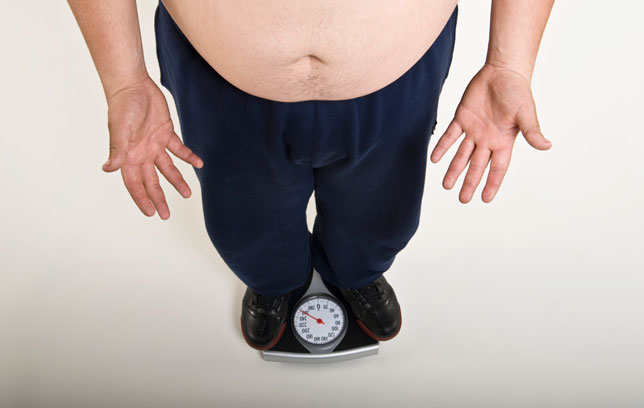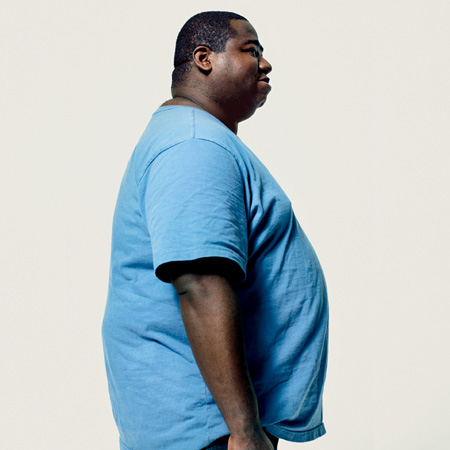I Hate Fat People:
I know that prejudice is a dangerous thing.
I was fighting my own prejudices when I accompanied my son on a presurgery visit with the doctor. What should have alarmed me was the cursory way the doctor responded to our questions, and maybe the way he whined about health-care reform. But now, after two failed operations on my son's hand, I think I should have also paid attention to my deep misgivings when the doctor first walked through the examining room door—because he was fat. And I hate fat people.
Yes, I know we're not supposed to say that. Hating fat people is like hating any other social group; it's good neither for the object of hatred nor for the people doing the hating. Being fat is not a reliable indicator of incompetence, even among doctors who see the health consequences of obesity every day in their examining rooms. And given that two-thirds of Americans are now overweight or obese, you're liable to be in the position of hating your wife, your mother, your best friend, or your child, along with Santa Claus and Oprah Winfrey.
And yet an awful lot of us hate fat people, and the fatter we become, paradoxically, the more we hate them (us). In scientific studies, men say they would rather date a recovering drug addict than a fat woman. Schoolchildren say they would rather have a friend who's in a wheelchair or who has a facial disfigurement than a friend who's fat. Obesity researchers actually have a Fat Phobia Scale, a questionnaire for determining weight bias. Even some nurses, who can spend much of their time caring for fat people, admit that they're repulsed by them. All those hurtful words about fat people leap to mind—lazy, unattractive, self-indulgent, shapeless—plus a few others the nurses might suggest, like "hard to roll over in bed."
Fat advocates, an increasingly vocal group, protest that hating fat people is the last socially acceptable prejudice. It infuriates them that obesity is a standard topic of comedy both low and high, from "Yo mama so fat" jokes to Shakespeare's "huge hill of flesh," Falstaff. They argue that being fat is fine—even "flabulous." If there's any connection between obesity and ill health, they argue, it's not the fat that's causing the sickness—it's the fat bias. And they act, as I complained to a friend one day over lunch at a New York restaurant, as if it's the airlines' fault when seat 4E can't quite contain their bulk.
"I hate fat people too," he replied.
Then we started to count the reasons for our hatred. Mostly it was because of the excuses. They blame their girth on bad genes or big bones. They blame fast-food companies or high-fructose corn syrup. They blame "social contagion." ("Find Yourself Packing It On? Blame Friends" a 2007 headline in the New York Times declared.) Isn't it their own fault? Why not just say, "It's because of what I choose to put in my mouth. It's because I fail to work it off"?
Obesity researchers argue that our sugared-up, Whopper-hawking, Thickburger world "hijacks" and "subverts" the systems that ought to regulate eating and weight. But if our "obesogenic" environment really makes being fat almost inevitable, then how had my friend and I managed to stay thin?
We had ordered Thai noodle salads, which when they arrived at our table turned out to be as big as haystacks. So were we skinny because we proceeded to pick at this astonishing mass of food instead of wolfing it down? Was it because we had the sense to drink water with the meal, skip dessert, and fit plenty of exercise into our schedules? Was it, in short, our moral superiority, as we plainly liked to think? Or was it just dumb luck, a by-product of genes, upbringing, or living in neighborhoods where we could go for a walk without risk of a drive-by shooting? It made me want to take a closer look at the attitudes and assumptions underlying our biggest health threat.
I didn't expect it was going to make me like fat people any better.
Almost the first thing I learned, a little awkwardly, is that I am apparently one of the fat people. The body mass index (BMI), a quick ratio of weight to height squared, is the standard tool for measuring how fat we've become. (You can easily calculate yours at nhlbisupport.com/bmi/. But be prepared for an ugly surprise. Console yourself with the knowledge that the BMI is better at analyzing population trends than assessing individual well-being. It's also not very good at distinguishing fat from lean muscle.) I row 7 to 10 miles three or four times a week. So I had assumed that I could let my weight take care of itself. But at 5'11'' and 200 pounds, I had a BMI of 27.9. That's well into overweight territory (which is a BMI of 25 to 30) and not all that far from obese (30-plus). Somewhere along the way, my shadow regimen of snacking and boozing had caught up with me. In the off-season, I count time on exercise machines according to how many India pale ales I burn off. My waistline had spread to 39 inches, and I had not seen the maximum normal weight for my height, 179 pounds, since my college days.
Like most people when they hear they may be fat, my first response was denial. I don't look fat—or at least I don't think I do. But this may just be the insidious way fat works: As everybody else gets fatter, studies suggest, our perception of what's fat also creeps upward, and fat starts to look okay. It's like having beer goggles on. It's only when we wake up in some leaner country, like France or Japan, or when we look at snapshots of random Americans from 1980 side by side with snapshots of random Americans from 2010, that it dawns on us: "Oh my god, how did we ever let this happen?" The stealth with which the blanket of fat has swept over us almost unnoticed is, as one writer recently put it, "a mystery batter-dipped in an enigma.
Or maybe it's not. The second stage in my denial took statistical form. In the course of an interview at a high-calorie, low-budget restaurant, a prominent food researcher leaned across the table and confided that a lot of people who are now deemed overweight would have been classed as normal a few years ago. In 1998, the National Heart, Lung, and Blood Institute changed government BMI benchmarks, lowering the normal/overweight cutoff from 27.8 to 25, and the obesity cutoff from about 32 to 30. "Overnight, the vast majority of the population of America became fat, whereas the day before they weren't," he told me.
When I repeated the overnight-change idea to William Dietz, M.D., Ph.D., the director of nutrition, physical activity, and obesity at the Centers for Disease Control and Prevention, he said, "Yeah, that's true, more people became classified as obese." But the rationale was medical, not political, he said: "Talk to me about whether those standards predict morbidity and mortality...the fact is that they do."
Under either BMI standard, old or new, I'd still be fat, and chances are, so would you. The U.S. obesity rate has doubled for adults and tripled for children and teens just since 1980. (The CDC says that's an apples-to-apples comparison, not a result of mixing old and new BMI standards, as fat-acceptance advocates sometimes allege.) Moreover, the rest of the world is tagging close behind. Our mothers could plausibly, if illogically, admonish us to clean our plates because of the starving children in China. But today, likely for the first time in history, the overfed outnumber the underfed by a large margin: There are 1.6 billion overweight and obese people worldwide, and 1 billion going hungry.
After denial, the usual next step in coming to terms with an unpleasant idea is anger, and there are plenty of reasons to be angry about fat. It's not just an epidemic—a pandemic, really—but a monster whispering sweet things in our ears while sticking us right in the gut. The extra cost of medical care for obesity in the United States was $147 billion in 2008, Dr. Dietz estimates. That's 10 percent of the nation's total health-care bill, due mainly to the chronic disorders linked with obesity, including diabetes, coronary artery disease, congestive heart failure, hypertension, stroke, osteoarthritis, sleep apnea, depression, and certain cancers (among them larger and more aggressive prostate tumors, according to a new study). Taxpayers pick up half that cost through Medicare and Medicaid programs. And since private insurers pass the other half on in the form of higher premiums, we end up paying the whole bill for obesity: an annual fat tax of $483 on every man, woman, and child in the nation. That bill—$2,415 out of my family's annual budget, which is more than we spent last year on clothes—is likely to grow. Childhood obesity used to be rare, Dr. Dietz points out. But today, obese 11-year-olds are diagnosed with type 2 diabetes often enough that doctors have stopped calling it "adult onset" diabetes. Extremely obese teenagers can be candidates for coronary artery bypass surgery. That means they'll run up higher-than-normal medical bills in the usually low-cost young adult years.
Being obese also means they'll face diminished prospects for a normal life in almost every regard. Studies have repeatedly shown that an obese job applicant is less likely to be hired than a normal-weight applicant with identical qualifications. Even if the obese candidate is hired, he or she is less likely to be promoted and receive a raise. That's partly fat bias in action. But it's also economic reality: Apart from the extra medical cost to employers, a cost that ranges from an additional $400 to $2,000 a year for each full-time obese employee, fat also burdens companies with extra costs in the form of absenteeism, reduced performance, workers' compensation and disability claims, and premature death.
That puts families, companies, and the nation at an economic disadvantage. Productivity lost to overweight and obesity in the United States works out to $144 billion a year, according to a recent estimate by the Lewin Group, a health-care consulting firm.
In the past, a stocky kid who couldn't find a job could still join the military. But even the military now turns away 27 percent of young adults because they are "too fat to fight," in the words of a report recently issued by a group of retired brass. Obesity, the report asserts, is "an epidemic that threatens national security." A nation of builders, inventors, risk takers, and rabble-rousers has gone thick in the middle.
The final stage in coming to terms with an unpleasant idea is acceptance, and a lot of voices now say that's how we should deal with obesity. "There is nothing wrong with being fat. Just like there's nothing wrong with being short or tall, or black or brown," writes Marilyn Wann, whose book Fat! So? is a manifesto for the fat-acceptance movement. "These are facts of identity that cannot and should not be changed. They are birthright. They're beyond cures or aesthetics. They provide the diversity we need to survive." Wann—a reported 5 feet 4 and 290 pounds—says, "We should all celebrate, fat and thin alike, that we're all wonderful." She says she does weekly "high-intensity, low-impact" workouts, and that she's healthy. People need to forget about weight, she argues, and focus on their health and fitness. And she's right, up to a point. But she also apologizes for being out of breath from making her way to the phone.
Wann won't even use the word "obesity" because "it medicalizes normal diversity." It's not the fat that causes bad health, she says. It's how everybody else reacts to it: "So if a fat person receives poorer quality health care than a thin person does, that might have an effect. If fat people live in a society that's stigmatizing and discriminatory, we know that discrimination has a profound effect on people's health."
These are accurate descriptions of the status quo. But they glaringly omit any hint that individuals themselves should take responsibility for staying within even a given range of weights. In the worldview of fat acceptance, fat people can jeopardize their health by trying, and failing, to lose weight. Efforts by government to reduce obesity rates are "a eugenics project," a way to "eradicate fat people from society."
According to fat-acceptance advocates, the abundant medical evidence that obesity itself is killing fat people is just part of the Big Lie. The CDC labeling obesity an epidemic doesn't make sense, says Jonathan Robison, Ph.D., an exercise physiologist at Michigan State University and a proponent of holistic health. Robison, that rare creature, a normal-weight American, argues that prejudice against fatness has "biased the science into saying things about the relationship between health and weight that are not supported by the research."
He acknowledges that people who have a higher BMI are more likely to develop type 2 diabetes. In fact, about 55 percent of newly diagnosed cases are obese people. But that doesn't mean that 55 percent of obese people are diabetic; only about 15 percent are. So obesity doesn't necessarily cause diabetes, he argues. It's just a correlation, and having the condition doesn't warrant the recommendation of weight loss as a remedy. "Let's say being bald for men is a risk factor for heart disease. That doesn't mean if you give a bald man a toupee you lower his risk."
By way of suggesting that some fat people can be healthier than thin people, Robison cites a 2008 study published in the Archives of Internal Medicine. One of the study's conclusions was that a quarter of normal-weight adults were "metabolically abnormal," meaning they had multiple cardiovascular disease risk factors. But 31.7 percent of obese adults, the study noted, were "metabolically healthy." Asked about the peculiar apples-and-oranges phrasing, Robison replies that the authors were probably trying to emphasize results that were "counterintuitive."
But on closer reading, those counterintuitive results turn out to be misleading. A more logical way to state the study's findings is that a quarter of the normal-weight people were not healthy—and neither were 68.3 percent of the obese people. And this is the problem with the fat-acceptance movement. Its advocates start with a sensible message to stop obsessing about body type and focus on exercising and eating right. They make the valid point that fat doesn't necessarily pose a health problem for some people. But then they ignore the evidence that fat is crippling or killing almost everybody else. Because fat turns us all into masters of denial, what comes through is the dangerous message that all fat people are fit, and that it's okay to keep on doing nothing.
A recent Brigham Young University study seemed almost designed to deliver this message. It made headlines on fat-acceptance Web sites because it reported that obesity produces no substantial ill-health effects in people under 40. But it measured "health" by analyzing study participants' prescription drug use, so the results are hardly surprising. Young adults rarely see doctors in the first place, and drug treatment is typically a late stage in the development of any disease. The study's conclusions were like pronouncing a building sound in the first phase of a termite infestation, says David Katz, M.D., M.P.H., the director of Yale University's prevention research center. "The problem is that when your house is infested with termites, it stays infested, and eventually it may fall down."
In truth, the repeated insistence that all the diseases associated with obesity are just a coincidence—a matter of correlation and not causation—echoes the defense used by the tobacco industry for decades as it tried to deny the deadly effects of their products. When fat people disproportionately end up with diabetes, heart disease, or any condition on the long list of other medical disorders, it probably isn't much comfort to them—any more than it is for cigarette smokers with lung cancer—to say, "I thought it was only a correlation."
In a complex world, direct cause is the hardest thing for science to prove, and people in the fat-acceptance movement are smart enough to know that. But they act instead like cigarette smokers fighting for their so-called rights, regardless of the costs they impose on society and themselves. Until they acknowledge that fat can kill just as tobacco can, all the talk about being fat and fit, and about obesity as a sacred and unchangeable fact of identity, is just a sham. Overeating is even more emotionally fraught than smoking is, and what they really mean to keep sacred is the right to continue doing it without any sort of limitations.
That's the message a writer named Shelley Bovey got. She launched the British "size acceptance" movement with her book The Forbidden Body ("A new battle cry for 'fat girls' everywhere: Don't lose weight—lose guilt and inhibition!"). But later Bovey admitted that at her heaviest she was miserable and felt short of breath. So she lost 91 pounds and wrote a new book about becoming thinner. At her new weight of 175 pounds, she wasn't trying to starve herself or abandon her cause, and she continued to fight discrimination against fat people. But she told a British newspaper, "I got hate mail. I lost all my friends in the size-acceptance movement. They wouldn't even return my calls. People were very angry."
Losing weight was a betrayal.
So after all this, do I still hate fat people?
I don't.
The world is already full of stupid bigotry, and what fat people endure is stupider than most. "Every fat person I know has a 'mooing' story," says one fat activist. (That is, some jackass has mooed at them in a public place.) Giving them a harder time than they already have is like being a grade school bully who zeroes in on the obvious target, sometimes with horrible consequences. Adolescents who are teased for being overweight are two to three times more likely to have suicidal thoughts or behaviors, says psychologist Rebecca Puhl, Ph.D., the research director for Yale's Rudd Center for Food Policy and Obesity. And yet even health-care providers commonly—and mistakenly—believe that a strong dose of disapproval encourages people to lose weight.
Instead, the social stigma just keeps fat people away from the doctor, out of the gym, and afraid to do anything other than stay home—and eat. When a doctor sends a patient away with the vague admonition to lose weight, the advice often just discourages a return visit, in part because those words alone generally produce no results.
Ignoring the weight issue entirely might actually work better. For instance, a program at the University of Nevada simply taught people how to handle the social stigma and distress that came with obesity. Weight loss followed almost incidentally, perhaps because the program taught people coping mechanisms that didn't involve food.
A focus on health rather than weight also seems to help. Research suggests that when doctors issue "walking prescriptions," patients are more likely to increase their activity levels. "Walk 1 mile. Take 6 days weekly. Increase dosage at will."
But learning to treat fat people decently shouldn't mean endorsing obesity as a new norm. Some researchers have suggested that TV fails to portray overweight and obese people in proportion to their numbers in the population, and in romantic contexts. Instead, they turn up as objects of humor. (Mike & Molly, a new sitcom featuring two fat people who begin a romance, will probably not pass the test for political correctness. "Sweet Jesus," Mike's police partner remarks when he embraces him, "it's like hugging a futon.")
When I first ran into this idea of fat people as positive role models, it struck me as akin to turning smokers into people worth emulating. A survey last year by the Nuffield Health, a U.K. health charity, revealed that many obese people either don't recognize that they have a problem or don't plan to do anything about it. Nuffield bariatric surgeon Michael J. McMahon, Ch.M., Ph.D., argued that the increasing profile of fat actors in British entertainment makes fat people think obesity is normal. "We talk about the dangers of skinny media images," he told the BBC, "but the problem actually swings both ways." That is, featuring positive images of obesity makes about as much sense as celebrating anorexic models in fashion magazines.
If the idea is just to make fat people feel welcome at the gym, or the office, or out for a walk in the park—that is, if the idea is to let them (us) lead normal lives—that sounds like one way we can start to help ourselves. We are in this together. We all need to get more exercise, eat better, and, sorry, lose a few pounds. (I've dropped 10 pounds since I began the research for this article. What I am putting in my mouth less often, sadly, is beer. Will it last? Talk to me in the off-season.) We can reduce obesity rates if we work at it together. But we won't get there by hating each other or indulging in a war of words.
That's just a way to avoid the first step: looking in the mirror and admitting that we have a problem.
The True Costs of Obesity
You've heard the statistics: Lose enough weight, and your risk of diabetes will drop by 30 percent. You'll slash your cholesterol by 5 percent. True, and true. Even so, two-thirds of Americans are overweight or obese. "People need to fully appreciate all the consequences of obesity," says John Cawley, Ph.D., a health economist at Cornell University, "not just the ones that show up on the health-care bill."
12.4
Average amount of body fat (in pounds) gained from "upsizing" a fastfood value meal three times a week for a year
68
Percentage of unnecessary calories your body stores as excess weight after you wolf them down
$175.20
Average cost of adding 100 calories—about 18 Cheez-Its' worth—to your diet every day for a year
88
Percentage increase in a man's likelihood of not being in the mood for sex if he's obese
18
Number of times a man misses out on sex in a year if he's obese
"If everybody paired off according to weight, then being heavy wouldn't affect your probability of having sex," says Cawley. "This means some obese people are not willing to date each other."
169
Percentage increase in a man's likelihood of suffering erectile dysfunction if he's overweight
$1,429
Amount by which annual medical spending on an insured obese person surpasses spending on a normal-weight person
$147 billion
Estimated amount of U.S. health-care spending attributed to obesity in 2008 "Obese people use more health care, but most don't pay any more for health insurance from their employer or the government," Cawley says. "Lighter people are subsidizing them."
3.4%
Wage penalty for obese men in the United States
$285,000
Average yearly cost of obesity-related medical expenses incurred by a company with 1,000 employees
Fat and Unhappy
What if you had to decide between packing on the pounds or losing your job, your house, a limb, or even your wife? Which would you choose? We surveyed Men's Health readers to find out.
53
Percentage of respondents who would rather go bald than permanently gain 20 pounds
We laugh at comb-overs, but we scoff at spare tires. "With balding, there's no perception of personal responsibility," says Rebecca Puhl, Ph.D., research director at Yale University's Rudd Center for Food Policy and Obesity. "With obesity, there's a common reaction of disgust—the assumption that you lack self-control."
45
Percentage of respondents who would rather lose an arm than permanently pack on 100 pounds.
This one also boils down to blame. "In our country, it's considered your fault if you're fat," says Puhl. "But if we see a disabled person, we don't assume they were driving drunk and had a car accident. Instead we assume they were born that way or were injured. We feel empathy, not judgment."
55
Percentage of respondents who think it would be worse to permanently gain 100 pounds than have their wife cheat on them
82
Percentage of respondents who'd consider it grounds for divorce if their wife gained 100 pounds
20 pounds
Amount of weight gain respondents consider a dealbreaker in a dating relationship "Men may perceive their social status as being lower if their partner is overweight," says Puhl. "Part of this may be due to the social contagion effect—if you associate with an obese person, you may be stigmatized too." In a 2005 Obesity Research study, men said they would prefer a sexual partner who is missing an arm, is in a wheelchair, or has a history of suicide attempts or STDs over an obese bedmate.
59
Percentage of respondents who would rather lose their job than permanently gain 50 pounds
"Even if you keep your job, gaining weight could affect advancement," says Puhl. The Journal of Vocational Behavior reports that an obese employee is 37 times more likely to report job discrimination—a missed promotion, an unfair termination—than a normal-weight person.
57
Percentage of respondents who would rather drown in debt for the next decade than permanently put on 50 pounds
59
Percentage of respondents who would prefer a foreclosure on their home than a permanent gain of 100 pounds
For social capital, thinness may be more important than money, says Puhl. "If you are thin, you're often seen as happy, successful, and achieving life goals."
- Prev:Lean Belly Prescription
- Next:Body Mass Index Facts
-
In Defense of a Daily Doughnut
Have you decided to cut out your favorite food—say, pizza? It sounded
-
The Best Tips On Earth: Weight Loss
Avoid White Foods Cut white foods such as salt, sugar, ice cream, an
-
Eat Sugar and Still Lose Weight
According to its publicist, sugar is a health food. After all, it cont
-
Why Dwayne “The Rock” Johnson Is Technically Obese
When Furious 7 set box-office records on its opening weekend, there wa
-
How to Buy Healthy Food
Snack smart before you fill your cart: Eating just one piece of fruit
-
8 Simplest Diet Fixes Ever!
The Internal Revenue Service is known as the most hated government ins
- DON'T MISS
- Transform Your Body:
- Abs Diet Breakfast Recipes: Omelets
- Diet Strategies: Stop Food Cravings
- Food IS Medicine!
- Weight Loss Success: Beat the Buffet
- Can You Catch Obesity?
- Diet: Weight Loss and Metabolism
- Diet Strategies: Exercise and Weight Loss
- How To Eat 63 Percent Fewer Calories
- Belly Off: Religion Weight Loss Success Story




